#and he holds himself to standards of success as set by his parents/societal expectations
Explore tagged Tumblr posts
Text
i need answers about this line. close EMOTIONALLY? close PHYSICALLY?? artem. mr wing. explain yourself

#artem wing#zuo ran#tears of themis#there's just no way he didn't at LEAST ~sort of~ date some people in college#he's good-looking and smart. obviously an eligible bachelor#and he holds himself to standards of success as set by his parents/societal expectations#so i guarantee he's has a pseudo-gf before#like. i bet he knows how to kiss a girl but like... not make out yknow LMAO#he knows how sex works ~in theory~ but he's never actually applied that knowledge#im gonna jump his bones in the back of my hyundai sonata ♡#duchess decrees!
28 notes
·
View notes
Text
BLOGTOBER 10/4/2020: SOCIETY
Without having a survey to back me up, I feel comfortable asserting that as a horror fan, you go through different phases with SOCIETY. It’s a basic fact of life, and yet it morphs and mutates underneath you, shocking you anew just when you think you’ve got a grip on it. You never forget your first time, because there is simply nothing like it. Then, after you get over the initial shock of its patented brand of body horror, you start to take it for granted; it's so broad and monolithic that it becomes something like the Grand Canyon--when it’s not right there in front of you, you begin to experience it more iconically, as part of the wallpaper of existence, rather than an in-your-face confrontation with the limits of experience. Then, you revisit it every few years (or months, depending on what sort of person you are), and the prophylactic layer that your brain has wrapped around your memories of it--the one that allows you to think of SOCIETY as a fun, wacky cheap thrill--begins to crumble, and you realize all over again how iconoclastically vile it is. Wherever you happen to be at, with this inimitable genre landmark, you'd be hard pressed to deny that it earns its royal status among horror movies, just for being so uniquely fucked up.
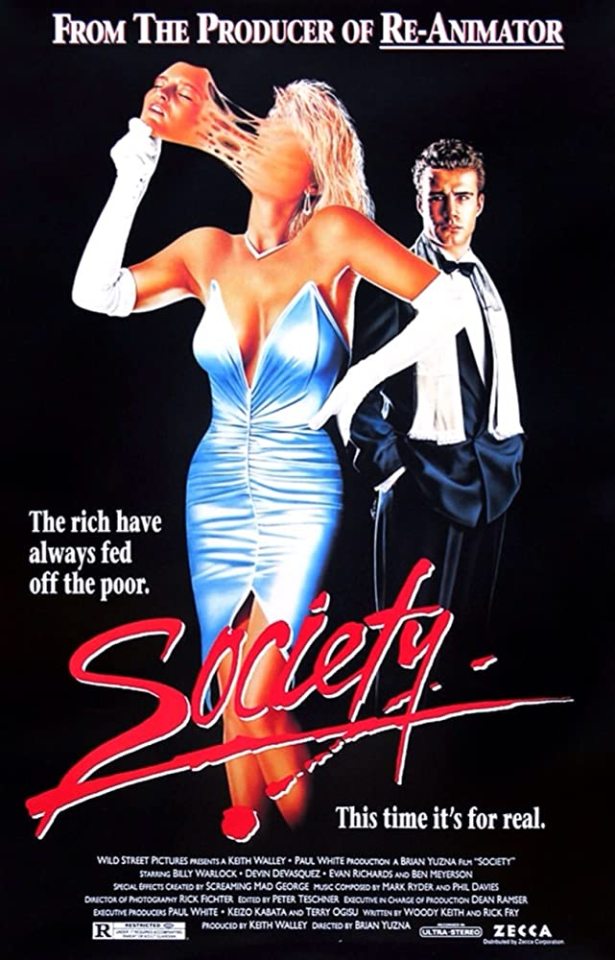
Filmmaker Brian Yuzna is best known as the co-creator of the indispensable RE-ANIMATOR (or as the co-writer of HONEY, I SHRUNK THE KIDS...depending on what sort of person you are, again), itself a milestone achievement in the blending of sex and gore that so characterized '80s horror production. That film clearly brought out the best in Yuzna and frequent collaborator Stuart Gordon (also of HONEY, I SHRUNK THE KIDS fame...among other things), but it's interesting to see how they operate apart, to understand the unique ingredients that each filmmaker brought to the more perfect union of their classic Lovecraft adaptation. Gordon skewed darker and more intellectual, as evidenced by the end of his career with the shattering mob thriller KING OF THE ANTS, the disturbing true crime drama STUCK, and the Mamet-penned EDMOND. Yuzna, for his part, is almost anti-intellectual, preferring to cook up blackly comic, semi-pornographic nightmares like his two increasingly horny RE-ANIMATOR sequels, the terminal S&M fantasy RETURN OF THE LIVING DEAD 3, and the shamelessly hokey comic book adaptation FAUST: LOVE OF THE DAMNED. Yuzna's lack of shame is really his defining feature as an artist, and nowhere is this more obvious than in his directorial debut and signature masterpiece, SOCIETY.
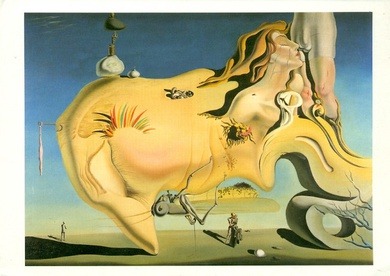
Salvador Dali's "The Great Masturbator," a chief visual inspiration for SOCIETY.
Yuzna was able to leverage the success of RE-ANIMATOR to lock in two directorial opportunities, BRIDE OF RE-ANIMATOR, and a bizarre body horror exercise about a Beverly Hills orphan who discovers that not only are his adoptive family from a different bloodline, but they're not even from the same species. That both pictures employed the writing team of Woody Keith and Rick Fry gives you a little taste of what to expect from SOCIETY, but to be frank, the latter threatens to make the former look like a very special episode of ER; "overkill" barely begins to describe SOCIETY’s ambitious assault on the human body. In a recent interview, the philipino-american director giggles perversely, "I think my friends were a little embarrassed for me (when they saw SOCIETY)," and this sound bite reminded me that the last, most important ingredient that Yuzna contributes to any project is unabashed joy. It's a little hard to imagine stomaching SOCIETY without it.
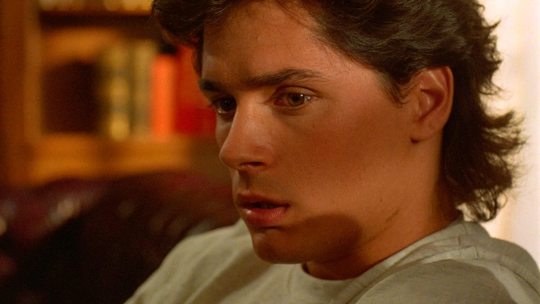
In this unusual scene from the class struggle in Beverly Hills, Billy Warlock (son of HALLOWEEN 2's Michael Myers, Dick Warlock) plays Bill Whitney, a rich, handsome, athletic high school student with a heavy duty anxiety disorder. Although he appears to have it all, he is plagued by nightmares and hallucinations, reflecting suspicions that the family that spoils him is also out to get him. Perhaps this is all understandable, though. Bill is under a lot of pressure these days, with his parents devoting all of their attention to his sister's coming out party, and his narcissistic girlfriend pushing him to ingratiate himself to the assholes higher up the social ladder; it's enough to make any teenager feel alienated and insecure. But, do these garden variety anxieties account for his visions of his sister's body deforming itself unnaturally, or the dubious evidence he finds that her debutante ball involves incestuous orgies and human sacrifice? Is Bill simply crumbling under the strain of societal expectations, or is the friction with his shrink, his parents, and his peers all symptomatic of an elaborate plot against him by elites who are truly less than human?
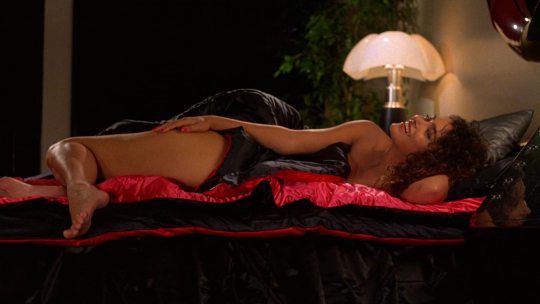
I can’t believe they use this cheapo blanket trick MORE THAN ONCE in a movie that is famous for its unforgettable special effects, and I guess I kind of love it.
In case I haven't made the answer abundantly obvious, I'll add that while SOCIETY is the purest expression of Yuzna-ness on the market, it has an important co-author in Screaming Mad George. The eccentric japanese FX master, whose name is apparently an amalgamation of Mad Magazine, Screamin' Jay Hawkins, and...George, has produced some of horror's most outrageous makeup and visual effects, mostly for Yuzna, many of them in SOCIETY. If you've seen even a trailer for Alex Winter's 1993 oddity FREAKED--which is itself a grossout criticism of American social standards--then you are already familiar with SMG's trademark style. He specializes in twisted perversions of the human form that would make a cenobite blush, driven by a penchant for puns, and influenced equally by THE THING's Rob Botin, and Big Daddy Roth’s Rat Fink style. Screaming Mad George is instrumental in articulating Yuzna's premise: that behind the shimmering veneer of success and sophistication, the upper class are just a bunch of degenerates, who literally degenerate into something unimaginable behind closed doors. It's impossible to imagine SOCIETY without his sinuous, slithering monstrosities, or his indescribable realization of their most important social event, "the shunt".
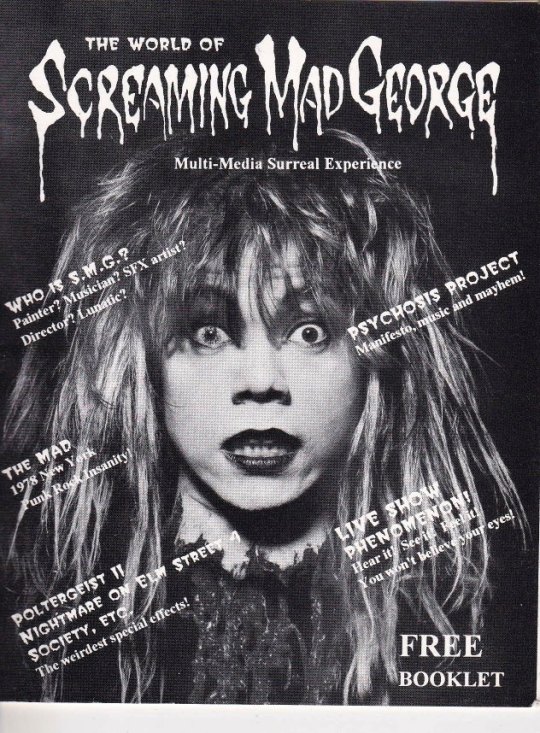
One of many great images from a zine I wish I owned, on SMG’s Facebook page.
It's easy to get overwhelmed by SOCIETY's visual impact, but its message is just as potent now as it was at the end of the Reagan era: Rich people are not only different from the rest of us, but in fact, they aren't even human. Writers Keith and Fry make an interesting choice of hero to help put this across. A lazier writer would have selected any archetype from the Freaks and Geeks set to create an easy Us vs Them tension, but SOCIETY is led by a promising young man who, for reasons he himself does not yet understand, is just not "the right kind of people". Bill appears to have every advantage in life, including a level of popularity that wins him presidency of the debate team despite his nerdier rival’s superior prowess--and yet, he suffers from a stigmatizing psychiatric disorder that is the natural result of feeling indefinably different from one's peers, and intuiting that, as a consequence, they don't even really like you. The shallow jock with deep-seated emotional problems is a much more interesting protagonist for this kind of social allegory than the charismatic outcasts that you get in movies like THE FACULTY and DISTURBING BEHAVIOR, for whom the idea that the elites could be aliens is just de rigueur.
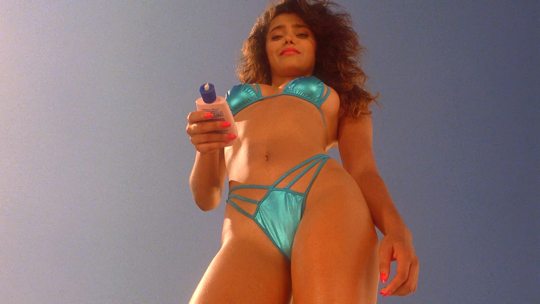
It's worth noting that this complexity of character extends to Bill's love interest, sympathetic society girl Clarissa Carlyn (Playboy Playmate Devin DeVasquez). At first, she seems villainously eager to introduce Bill to the many splendors of "the shunting", but as the plot against him mounts to its horrifying conclusion, she defects. There appears to be a reason for this, although honestly, this is the most difficult part of SOCIETY for me to wrap my head around. Clarissa lives as an essentially independent adult, only burdened by her mother (Pamela Matheson), a possibly brain damaged hulk who lurks in and out of various scenes just to be disturbing, always announced by some toots on a tuba, before eventually siding with our heroes. I'm really not sure what's supposed to be going on in this part of the movie, except that this character contributes to a number of distasteful jokes. But, I hold on to the idea that by virtue of whatever disorder Mrs. Carlyn suffers from, she serves the purpose of priming Clarissa to rebel, since her very existence makes her daughter something of a societal outcast herself. That's the best I can do.
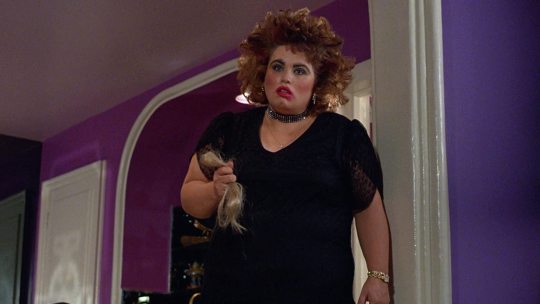
In any case, everyone working on SOCIETY commits completely, with Mrs. Carlyn being no exception. The movie's climactic orgy of the damned is an all hands on deck operation, just as reliant on Screaming Mad George's artistic abilities as it is on the actors' responsibility to make you believe that this fucked up shit is really happening. There's a visceral patina of sleaze spread over the entire film, dripping from the way that characters talk to and touch each other, flirting and flaunting their bodies in a distinctly unseemly fashion, even when it stays within the realm of mundane reality. This constant sinister, insinuating attitude on the part of the whole cast lays the foundation for what is to come, and while I appreciate everybody's hard work, my favorite performance is from an actor who only comes in at the very end: David Wiley as society king Judge Carter. Wiley's career consisted almost exclusively of the most ordinary sort of television work, which makes his outrageous turn in this alien porno flick all the more respectable. While other characters transition from suspicious pod people to full-on mutated perverts, Judge Carter has to show up just for the finale, establish his authority, rip off his clothes, and plunge straight into a sea of slime, happily fisting his way through the cast. Wiley meets this challenge with aplomb, making of himself a hybrid of Robert Englund and Gene Hackman, perfectly embodying the movie's joyful absurdity, and never betraying the slightest hint of embarrassment.
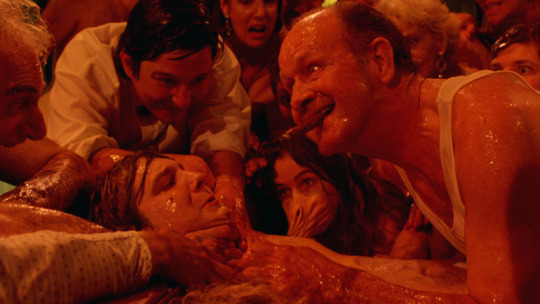
SOCIETY is very much a don't-look-down type of endeavor, a fairy that could expire at the slightest lapse in faith. There's a visual pun in the last act that's so gross, so offensive, so frankly idiotic, that I don't have the courage to describe it; my whole body tenses up when I know this scene is coming, as if it were the meat hook scene in TEXAS CHAIN SAW MASSACRE or the brutal rape in the middle of SHOWGIRLS. I don't like it, but at the same time, I respect Yuzna's unhesitating commitment to show it to me, and I think that actor Charles Lucia should get some kind of award for shouldering the burden so valiantly. SOCIETY is a daring movie in the truest sense, a film with more balls than brains, and in this it exposes the limitation of intelligence and taste, and the real need for pure transgression, in producing art of any real value. You might argue with me about whether Yuzna's masturbatory magnum opus really qualifies as art, but to respond to that, I'll quote the great transgressor Alejandro Jodorowsky: "If you are great, EL TOPO is a great picture. If you are limited, EL TOPO is limited." So stick that in your shunt and smoke it.
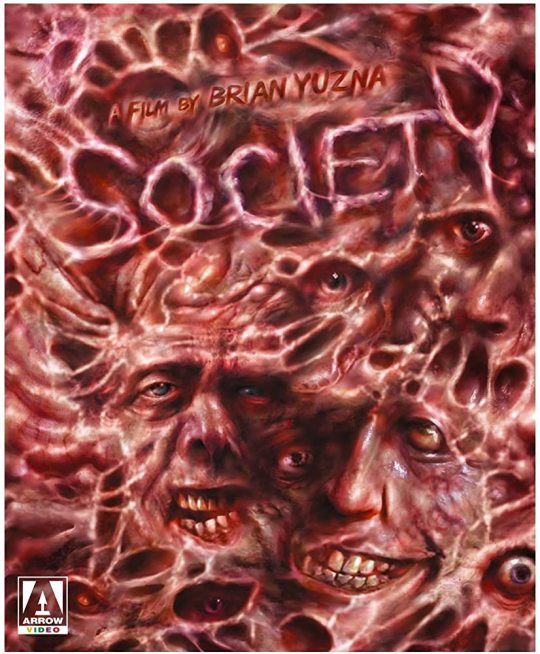
youtube
PS Here, have this stuck in your head for the rest of your life.
#blogtober#2020#society#brian yuzna#screaming mad george#woody keith#rick fry#billy warlock#Keith Walley#devin devasquez#david wiley#horror#black comedy#satire#body horror#social criticism
27 notes
·
View notes
Text
No ‘Game of Thrones’ or ‘Veep’? Here’s What To Watch Next.
New Post has been published on https://thebiafrastar.com/no-game-of-thrones-or-veep-heres-what-to-watch-next/
No ‘Game of Thrones’ or ‘Veep’? Here’s What To Watch Next.
Americans hate politics, right? The disingenuousness, the backstabbing, the sycophancy, the preening and posturing, the empowered elite, the way wealth buys influence, the dynastic nature of it, the sense that good people get torn apart, the way it feels disconnected from the concerns of The People.
But we love to watch all that on TV.
Story Continued Below
When “Game of Thrones” airs its final episode on Sunday, it will end the last water-cooler show currently on television—ubiquitous, inescapable and era-defining. And it also marks the end of an astonishing run of political TV. For all the medieval froofery and baroque violence, GoT was fundamentally a political drama—a show built around the quest for power, the conflict between idealism and pragmatism, and the uncomfortably blurred lines between “hero” or “villain” when it comes to exercising real power.
Its counterpart on the comedy side was “Veep,” the sitcom that also ended last week, known for its acidic, rapid dialogue, venal characters and inside-Washington jokes. For all its slapstick, people who work in politics tend to see it as cutting painfully close to reality, far more so than high-toned power dramas like “West Wing” or “House of Cards.”
Tomorrow morning, political obsessives will woke up bereft of both shows, with no destination for the next gutwrenching turns of the wheel of power; nothing to click on for crisp mockery of their day jobs. So what to watch next?
Here’s POLITICO’s guide to filling that hole, with shows new and old:
If you miss: The dark arts of political maneuvering
“Okkupert/Occupied”(Netflix)
Imagine that there’s a velvet-glove invasion of your country, where the democratically government is overthrown in a Russian plot you don’t see until it’s already happened. Your nation’s allies are quiet because they value global stability. The government-in-exile still has some power, and needs to choose carefully how to use it; they don’t know exactly who they answer to—The voters? Their new Russian overlords? Even so, partisan wrangling continues, and the public splits deeply.
That, broadly, is “Occupied,” a Norwegian TV show that was a smash hit in Europe and has flown under the radar in the U.S., where it is available on Netflix. The series imagines a scenario in the near future, where the U.S. has withdrawn from NATO and instability in the Middle East has choked off oil production. Norway elects an environmentalist prime minister promising to end oil and gas production in the country—but the European Union really needs that energy, and so the EU doesn’t bat an eye when Russia quietly takes Norway under its control. Welcome to the first episode.
From there, it’s a rollicking, complicated journey, as the prime minister strains between his idealistic vision of politics and what he needs to do to stay in power. As Russia’s authority in the country tightens, the threat of military conflict escalates, the plunges further into the kind of murky moral territory that makes the best political dramas truly compelling.
“The Americans” (FX/Amazon Prime)
The premise of “The Americans” is pretty straightforward: During the 1980s, a pair of Soviet spies (Keri Russell and Matthew Rhys) are deep undercover in the Washington, D.C. suburbs. Based loosely on the arrests of a real set of sleeper agents in 2010, they’ve lived and worked in the U.S. for decades while posing as Americans; not even their children, natural-born citizens, know the truth. While the Cold War rages, their marital relationship struggles as they balance their obligations to country, family and each other—all while an unsuspecting FBI agent moves in across the street.
Tense, sometimes heartbreaking, and always immaculately executed, “The Americans” is one of the few shows that can match GoT in its richness and complexity. As on “Thrones,” there’s a mix of family drama and geopolitical strategy, the threat of violence and the constant worry of exposure. (And unlike GoT, it’s also a very intimate portrait of a marriage.)Characters are deeply drawn, with beliefs, anxieties and ambitions that shift over the seasons and shape their storiesaccordingly. And when they must “do vile things for the good of the realm,” to borrow Lord Varys’ phrase, it has consequences—for their marriage, their friendships, their family, their homeland and adopted nation and their own consciences.
If you miss: That tug-of-war between idealism and power
“Barry” (HBO)
“Game of Thrones” fans were apoplectic after the penultimate episode of the series, protesting that one of their favorite characters took a sudden, out-of-character pivot to being a genocidal maniac. In political terms, you might say her arc from political idealist to fire-breathing, Kissinger-style realist was too abrupt, lacking the nuance for which the series was previously known — something its Sunday night programming companion, “Barry,” has in spades.
If you’re looking for a more thorough portrait of how the preternaturally gifted among us tend to conveniently forget their better angels in the face of a potential threat, look no further than “Saturday Night Live” alum Bill Hader’s pitch-black satire about a hitman (and Afghanistan veteran) trying to make it as an actor in Hollywood. Hader’s Barry repeatedly tells himself that he’ll forsake his violent ways and honor his inner creative type “starting… now,” and it’s not much of a spoiler to reveal that it frequently doesn’t go as intended. The realpolitik of “Game of Thrones” has long lent itself to a real-life political comparison, and Barry’s inability to stop himself from cracking a few eggs for the sake of self-preservation is surely familiar to D.C.’s political class.
“Borgen” (DR1/PBS)
Ok, bear with us. Parliamentary dynamics don’t get everyone jumping out of their seats, especially those of us raised in the winner-take-all showmanship of American presidential politics, but a parliamentary government—where coalitions are necessary, require elected leaders to compromise on the issues most important to them and the results don’t always have widespread public support—makes for compelling drama. That’s especially true when, as happens to Birgette Nyborg on “Borgen,” you quickly and unexpectedly go from being a minor politician to the prime minister of Denmark, where the show was produced. Her hold on power is tenuous, and the abrupt nature of her ascension means that it is all quite new—for her as well as her advisers and family.
It’s a less-Sorkin-ish version of “The West Wing,” set in a country tiny enough that the head of the government goes home to her family’s small apartment at the end of the workday and cooks dinner.We see Nyborg struggle to bend without breaking, and while we root for her, we’re also mindful of how she owes some of her successes to her conniving and unethical communications strategist, who “Thrones” fans will recognize as Pilou Asbæk, the actor who played Euron Greyjoy. (Here, he’s given a role that asks more of him than cartoonish moustache-twirling villainy.) He has a hot-and-cold relationship with a TV journalist (Birgitte Hjort Sørensen, who had a major role as a wildling in season five of “Game of Thrones”). Everyone compromises their ethics all the time, the show seems to say, asking the question: Is what they get worth it?
If you miss: Powerful women battling societal expectations
“Halt and Catch Fire” (AMC/Netflix)
Being a woman in public life has always come with its own, uniquely irritating double standards, whether one is attempting to conquer territory as a real-life or fictional presidential candidate. “Game of Thrones” was driven by powerful women for much of its eight-season run, and “Veep”’s whole central half-joke is watching Selina Meyer manipulate the male-dominated landscape that also genuinely hems her in.AMC’s cult not-quite-a-hit “Halt and Catch Fire” provided one of the most nuanced, 360-degree portrayals of two women attempting to traverse an even more bloodthirsty world than a Democratic primary — the 1980s tech industry.
After a charming first season that mainly won fans among the tech-obsessed and‘80s-culture geeks, showrunners Christopher Cantwell and Christopher C. Rogers broke the mold by refocusing the series around its two female leads, portrayed by Mackenzie Davis and Kerry Bishé. Cantwell, Rogers, and their team of writers and designers built their show into a peerless dramedy that captured its leads’ anxieties, performances, and triumphs as women in a decidedly male-dominated milieu of gamers and hackers. The four-season series is now available in its entirety on Netflix.
“Big Little Lies” (HBO)
If you were to cut Cersei Lannister from Westeros and paste her among the monied Monterey Bay elite, she’d fit right in. She would sip wine with Madeline Mackenzie (Reese Witherspoon) while scheming up a plan to exact revenge on the parent of her daughter’s classmate for a trivial slight anyone else would let slide. She’d quietly judge Jane Chapman (Shailene Woodley) for being a single parent of a different economic class. She’d roll her eyes at the hippy-dippy yoga instructor Bonnie Carlson (Zoë Kravitz) married to a much-older man. And she’d envy Celeste Wright (Nicole Kidman) for the picture-perfect life she appears to have, never knowing what’s happening behind the oceanfront façade.
“Big Little Lies” is a show about many things, but foremost among them is its interest in the societal assumptions placed upon women. It’s a theme that will resonate with any “Thrones” viewer who has noticed the way that characters on the show treat Dany or Cersei or Sansa differently than they would a similarly minded male character. Season Two of “Big Little Lies” debuts on HBO on June 9, giving newcomers plenty of time to catch up beforehand.
If you miss: The relentless pursuit of power, with wit
“Billions” (Showtime)
The medieval chessboard George R.R. Martin constructed for “Game of Thrones” was, in many ways, a meritocracy so pure it had to be fictional — as long as one’s standard of merit is the ability to stab competitors and allies alike in the back toward no greater end than the accumulation of more power. Swap “money” for power, and you have the hedge-fund world depicted in Showtime’s “Billions.”
Prestige drama will be short a great deal of its bloodthirstiness in the absence of “Thrones,” but the existential clash between anti-hero Bobby “Axe” Axelrod, the eccentric hedge fund conquistador played by Damian Lewis, and Paul Giamatti’s crusading prosecutor Chuck Rhoades is plenty ruthless and zero-sum. The flaws of either man would fill a novel, and the show’s barrage of insidey, highbrow references will scratch the itch of “Veep”-watchers who relish the game of figuring out just who’s based on whom, and how closely this tracks the actual world we get served up in our daily news coverage. As the series has progressed, the threads between New York-style and Washington-style ambitions have grown even tighter, and its winks at real-world events more deliberate. Its comedy is darker than “Veep”’s, but its view of human nature every bit as unrelievedly cynical.
If you miss: Slow-burn stories where power is won incrementally over time (or lost in an instant)
“Wolf Hall” (BBC/Amazon Prime)
Considering how heavily real medieval history influenced George R.R. Martin while he crafted hisA Song of Ice and Firebook series, it should come as little surprise that a story about the real people surrounding King Henry VIII would make such for such easy viewing for “Thrones” fans.
Born to an abusive father, Thomas Cromwell rose from poverty to become a top adviser to Lord Chancellor Thomas Wolsey (played by Jonathan Pryce, familiar to GoTwatchers as the High Sparrow), the Catholic cardinal who was perhaps the most powerful man in Henry VIII’s early reign as king. But after Wolsey is unable to get the pope to annul Henry’s first marriage, other advisers to Henry push Wolsey out of power—which begins Cromwell’s long and unassuming climb to power, with an assist by Anne Boleyn, and to exact revenge on all those who turned against Wolsey. For students of back-room operators—those “Thrones” fans who thrilled to watch Varys or Littlefinger or Tyrion Lannister expertly scheme and execute on a plan—Cromwell’s exquisite use of leverage is utter catnip. And unlike those characters, the man actually existed.
If you miss: Satire of the shallow people in power
“The Newsroom” (CBC)
Not to be confused with the wordy Aaron Sorkin-created HBO drama of the same name, CBC’s “The Newsroom” is a blistering sitcom from the late 90s and early 2000s that follows the producers of a major news show in Canada as they navigate the petty bureaucracy and egotism of the media industry.
George Findlay, the main character, could well be Selina Meyer’s Canadian cousin, a bright and ambitious man drunk on his own power, mindful of his own status symbols (e.g. making constant and ostentatious calls to his BMW dealer for his perpetually-being-repaired car) and paranoid about even the slightest criticism or suggestion that his own self-image doesn’t match what other people see.
If you miss: A cuttingly profane and sardonic look at politics
“The Thick of It”(BBC)
Before the writer and directorArmando Iannucci created “Veep,” he was best known as the mind behind its abrasively funny British predecessor, “The Thick of It,” a wicked satire of the inner workings of the UK’s government, starring Peter Capaldi as Malcolm Tucker, the human buzzsaw who works as a spin doctor for the prime minister.
In many ways, the series will be instantly familiar to fans of “Veep.” It has the same scorched-earth insults and fast-paced rhythm, similar character archetypes and the naked aggression of people whose reach for power exceeds their grasp. And once you watch “The Thick of It,” try its spin-off film, “In the Loop,” where Capaldi reprises his role but the cast expands to include future “Veep” actors Anna Chlumsky and Zach Woods.
If you miss: Intra-family posturing
“Succession” (HBO)
To get it out of the way: “Succession” is a very compelling series that is very clearly about a very thinly fictionalized Murdoch family. Yes,thoseMurdochs, of Fox News and phone-hacking fame. That alone should be enough of a hook to get political insiders on board with HBO’s byzantine family drama, but if the dynastic posturing and sniping of “Game of Thrones” and the virulent profanity of “Veep” kept you watching from week to week, “Succession” might be even more compelling, especially to the hybrid cable news-watchers and tabloid-junkies among us.
Though much of the action lies among its protagonists — a diffuse group of sparring, wayward definitely-not-Murdoch children — the series’ true power lies in the performance of legendary British character actor Brian Cox as their definitely-not-Murdoch patriarch Logan. Logan Roy is an addled figure so contemptuous and vain that his power plays register more as desperate efforts to puff up his own fading grandeur. And in 2019, it’s not hard to see the series as a long troll of the dynasty currently occupying the White House.
Of course, if that doesn’t appeal, patient GoT fans can always wait for one of the three “Game of Thrones” prequel series HBO is currently developing. The first of them, tentatively titled “Bloodmoon,” is rumored to be arriving on TV in 2020 or 2021. Until then, there are always reruns.
Read More
0 notes